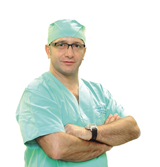Robotic Partial Neprhectomy
A technically difficult operation for the surgeon, a more difficult decision for the patient
In recent years, Robotic Partial Nephrectomy (RPN) has prevailed as the method of choice for the removal of selected, peripheral renal tumors, <4 cm as well as >4 cm, where they are technically amenable to partial removal or, finally, necessarily in tumors that they are in a solitary kidney so that the patient is not led to nephrectomy and hemodialysis.
However, even with the addition of the Da Vinci robotic system, partial nephrectomy remains a technically challenging operation for the surgeon.

How will the patient choose?
Numerous studies mainly from the United States of America (USA) have as their subject the correlation between the degree of experience of the surgeon in MRI and the degree of experience of the hospital center in relation to postoperative results, but also postoperative complications.
The conclusions drawn from these studies are quite interesting.
So it seems that the more experienced the robotic surgeon who will perform the MRI, the more the rates of postoperative complications, the length of stay in the hospital, and in addition the better oncological results are achieved.
In addition, the experience of the hospital center where the operation will be performed is an essential factor for the patient's smooth post-operative course (specialized staff, proper medical-nursing staff cooperation, appropriate logistical infrastructure).
Who is considered an experienced robotic surgeon?
The answer is also given here by studies conducted in centers in the USA.
The results of the studies showed that an experienced robotic surgeon is considered to be the one who performs at least 15-20 PMN per year.
The more experienced the robotic surgeon who will perform the MRI, the more the rates of postoperative complications, the time of hospital stay, and the better oncological results are achieved.
What is the experience at PMN?
The Director of the robotic urology center of the Metropolitan Hospital, now also at Apollonion Private Hospital (GeSY), Mr. Vasilios Poulakis, has performed from 2011 to 2023 today more than 1,000 PMNs, with very high success rates based on international standards.
After all, at Apollonion Private Hospital, robotic operations are carried out that cover the entire spectrum of urological diseases.
Consequently and based on international standards, Mr. Poulakis is considered one of the most experienced robotic surgeons at a pan-European level, having performed a total of >9,000 robotic operations to date.
In addition, Apollonion Private Hospital ensures a high level of patient safety and care, with the availability of the most modern logistical infrastructure, as well as well-trained and well-trained staff meeting the high demands of post-operative patient monitoring.
In conclusion, we must emphasize that the maximum benefits that the patient who will undergo MRI will have arisen when the "tool" called the robotic system is in the hands of a well-trained and experienced surgeon, who is able to take advantage of all the advantages that the use of the robotic system offers to the benefit of the patient.

Written by Vasileios Poulakis
Surgeon Urologist - Andrologist
PhD, University of Giessen, Germany - Associate Professor, University of Frankfurt, Germany
Director of the Metropolitan Hospital Robotic Urology Center
Apollonion Private Hospital (GESY)
